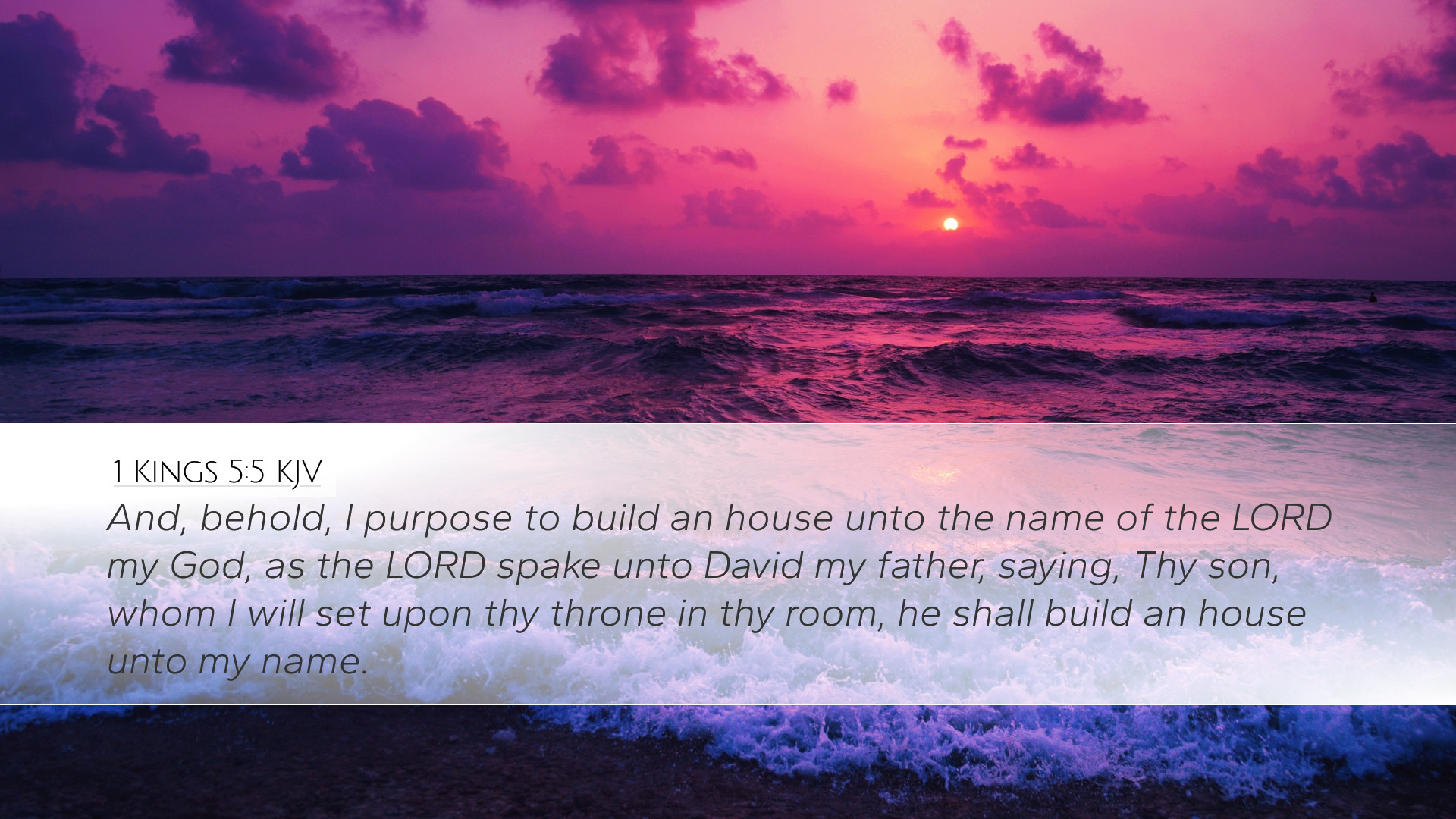Old Testament
Genesis Exodus Leviticus Numbers Deuteronomy Joshua Judges Ruth 1 Samuel 2 Samuel 1 Kings 2 Kings 1 Chronicles 2 Chronicles Ezra Nehemiah Esther Job Psalms Proverbs Ecclesiastes Song of Solomon Isaiah Jeremiah Lamentations Ezekiel Daniel Hosea Joel Amos Obadiah Jonah Micah Nahum Habakkuk Zephaniah Haggai Zechariah Malachi1 Kings 5:5
1 Kings 5:5 KJV
And, behold, I purpose to build an house unto the name of the LORD my God, as the LORD spake unto David my father, saying, Thy son, whom I will set upon thy throne in thy room, he shall build an house unto my name.
1 Kings 5:5 Bible Commentary
Commentary on 1 Kings 5:5
Verse: 1 Kings 5:5 - "And, behold, I purpose to build a house unto the name of the LORD my God, as the LORD spake unto David my father, saying, Thy son, whom I will set upon thy throne in thy room, he shall build a house unto my name."
Introduction
This verse lays the groundwork for a significant transition in the history of Israel, where Solomon, the son of David, prepares to construct a temple dedicated to God. This moment encapsulates the fulfillment of God's promise to David, bridging the covenantal theme seen throughout Scripture. The insights shared here draw upon the exegetical works of Matthew Henry, Albert Barnes, and Adam Clarke, offering a detailed exploration of the implications and theological significance embedded within this verse.
The Purpose of Building
The declaration from Solomon, "I purpose to build a house unto the name of the LORD my God," signifies a profound intention and commitment towards worship. Matthew Henry notes that this act symbolizes Solomon's recognition of God's supremacy and his desire to establish a permanent dwelling place for the Lord amidst His people.
- Divine Initiative: Albert Barnes emphasizes that the building of the temple is not merely a personal ambition but divinely sanctioned as God has spoken through David regarding this plan.
- Spiritual Implications: Adam Clarke elaborates on the spiritual implications of constructing a physical temple. It reflects the desire of God to dwell among His people and provides a visible representation of His presence.
God’s Promise to David
In this verse, Solomon refers explicitly to the promise made to his father David, which serves as the theological backbone of his endeavor. This promise highlights the continuity of God’s covenant, emphasizing that through Solomon, God's plans for Israel are being fulfilled.
- Covenantal Theme: Matthew Henry articulates that this section reinforces the importance of God’s covenants, suggesting that the lineage of David is crucial for the realization of God's kingdom on earth.
- Significance of Temple Construction: Barnes points out that the temple serves as a central hub for Israelites to worship and signifies the distinct relationship God has with His chosen people, which is established through David.
- Symbol of God’s Faithfulness: Clarke notes that Solomon's intention reflects the realization of God's unwavering faithfulness over generations, where the construction of the temple manifests God’s enduring presence among His people.
Theological Reflections
This verse is a profound reminder of the nature of God as a promise-keeping deity. It also raises several theological reflections regarding worship and the significance of setting apart sacred spaces.
- Worship and Dedication: The intent expressed by Solomon alludes to a broader principle concerning worship - that it should be intentional, dedicated, and directed towards honoring God.
- God's Desire to Dwell with Humanity: The construction of the temple illustrates God's desire to reside with His people. Clarke highlights that this theme perseveres through Scripture, finding fulfillment ultimately in Christ, who tabernacled among us.
- Context of Solomonic Wisdom: In the broader narrative, Solomon’s wisdom is manifested not only in his governance but in his understanding of worship's significance as a societal and spiritual foundation for Israel.
Application for Today
Pastors, students, theologians, and Bible scholars can draw meaningful applications from this text. The commitment to building a house for God can translate into creating spaces of worship in our communities and lives today.
- Community and Worship: Consider how we can build community around worship today. The temple was a gathering place; how can our churches embody this in their mission?
- Living Temples: The New Testament reveals that believers are the temple of the Holy Spirit (1 Corinthians 6:19). How can we live in a manner that honors this truth?
- Vision and Purpose: Solomon’s purpose is a challenge for modern-day believers. What is our purpose today in promoting worship and manifesting God’s glory in our lives?
Conclusion
1 Kings 5:5 opens a pivotal moment in the Biblical narrative, reminding us of the interplay between divine promise and human intention. The insights from Matthew Henry, Albert Barnes, and Adam Clarke provide a rich understanding of the implications this verse holds for understanding worship, God's faithfulness, and the importance of dedicated spaces for meeting with Him. Pastors and scholars alike can draw from these reflections to encourage a deeper commitment to worship and understanding of God's presence in our lives today.


